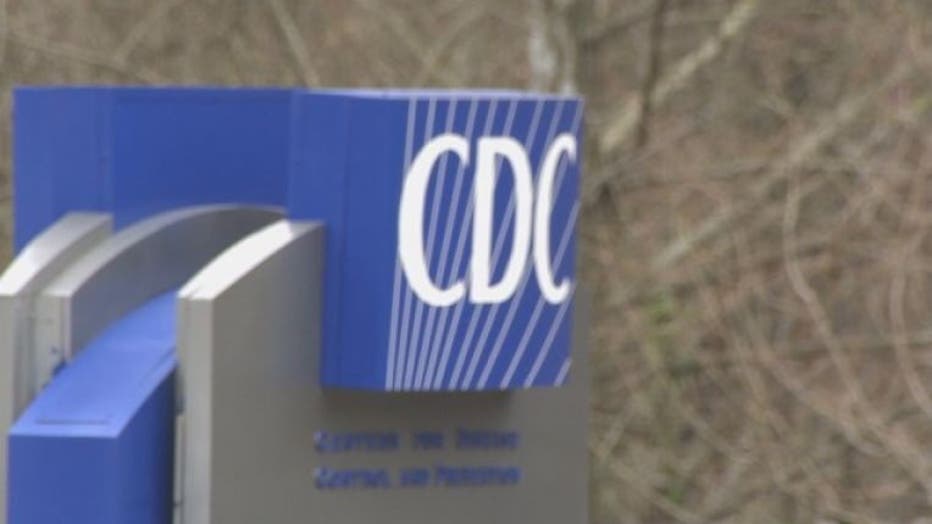Second CDC employee tests positive for coronavirus
ATLANTA - A second Centers for Disease Control and Prevention employee has tested positive for the coronavirus, the agency confirmed Tuesday.
A spokesperson for the CDC said the worker was asymptomatic and had been out of the office since March 20.
The employee is being quarantined at home and is reportedly doing well.
SEE ALSO: CDC employee confirmed to have coronavirus

The CDC announced last week another worker tested positive for the virus and was asymptomatic. That employee is also quarantined at home and is in good condition.
The first employee was not involved in the COVID-19 response, but it was unclear if the second employee was.
Both areas where the employees worked underwent a deep cleaning before other employees were allowed to return.
App users click here for live updates
State health officials expect to see more confirmed cases and deaths as testing continues and the virus spreads within local communities.
LIVE: Interactive map tracks global spread of COVID-19
DPH says it is working closely with the CDC, and state partners to respond to an outbreak of COVID-19 in the U.S., including Georgia. The goal is to quickly identify cases of COVID-19 and take the appropriate public health action to reduce its spread and protect the general public.
Public health officials have urged social distancing to slow down or stop the spread of coronavirus. According to the Centers for Disease Control and Prevention, adults who are 60+ and people with serious medical conditioners, such as heart disease and diabetes, are at higher risk of getting very sick from coronavirus.
Georgia Coronavirus Hotline available between 8 a.m. and 5 p.m.: 844-442-2681
Since the first cases of COVID-19 were confirmed in Georgia, Gov. Brian Kemp has issued a "shelter-in-place" order for groups "at-risk." Groups affected by the order include people living in longterm care facilities, have chronic lung disease, are undergoing cancer treatment, have a positive or are suspected to have a positive test, or who have been exposed to someone who tests positive for COVID-19.
All public schools in the state were ordered closed until March 31. Public gatherings have also been limited to no more than 10 people in order to prevent the spread of the virus. The executive order will also enforce a statewide closure of all bars and nightclubs.
Coronavirus shelter-in-place orders: 'At-risk' groups in Georgia; all residents in Atlanta
Mobile testing sites have been deployed in certain regions of the state, with more on the way. Kemp has said he does not plan to impose any statewide curfews, business closures or forced quarantines.
Though the governor has not declared a state of emergency for all of Georgia, many local municipalities have.
Monday evening, Mayor Keisha Lance Bottoms issued an executive order asking all residents of the city of "stay at their place of residence" for 14 days starting at midnight on March 24. The order also urges homeless people to seek out shelter and direct "government and other entities to provide it."
"Based upon our density & specific needs/concerns in Atlanta, I’ve signed a 14 day Stay at Home Order," the mayor posted on Twitter.
Officials in Dougherty County and Athens-Clarke County have ordered residents to stay home unless they’re going to work, buying food, seeking medical care or exercising.
“Drastic measures must be taken to decelerate the spread of COVID-19,” Albany Mayor Bo Dorough said at a news conference Friday. “We anticipate the results of the more than 1,000 tests we have conducted will confirm we have hundreds of people in Dougherty County with the virus.”
Atlanta and multiple suburbs have banned in-restaurant dining, limiting eateries to takeout and delivery service, as well as closing bars, theaters, bowling alleys and other gathering places. Tybee Island banned visitors to beaches, as well as the open consumption of alcohol.
Georgia has opened at least 13 drive-thru locations for virus testing and plans more. Kemp says priority for tests is being given to those at highest risk — the elderly, people who already have chronic illnesses, those in nursing homes or other long-term care facilities and first responders such as paramedics.
Know how the COVID-19 outbreak is impacting Georiga
Best prevention measures:
- Wash your hands often with soap and warm water for at least twenty seconds.
- If soap and water are not available, use an alcohol-based hand sanitizer.
- Avoid touching your eyes, nose, and mouth with unwashed hands.
- Avoid close contact with people who are sick.
- Stay home when you are sick.
- Cover your cough or sneeze with a tissue, then throw the tissue in the trash.
- Clean and disinfect frequently touched objects and surfaces
RESOURCES:
- Symptoms, testing and how to prepare amid growing COVID-19 outbreak
- Who is most susceptible to coronavirus? COVID-19 not just affecting older people
- Coronavirus cleaners: These products will kill COVID-19, according to the EPA
- Coronavirus and pets: Your cat or dog probably can’t get COVID-19, WHO says
- Will sick leave protect me if I get ill from coronavirus? 5 questions answered
RELATED: CoronavirusNOW.com, FOX launches national hub for COVID-19 news and updates.

